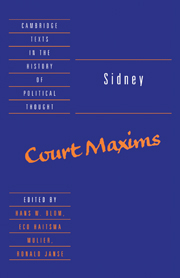Book contents
- Frontmatter
- Contents
- Preface
- Note on the text
- Introduction
- Principal events in Sidney's life
- Bibliographical note
- Biographical notes
- Court Maxims
- First Dialogue
- Second Dialogue
- Third Dialogue
- Fourth Dialogue
- Fifth Dialogue
- Sixth Dialogue
- Seventh Dialogue
- Eighth Dialogue
- Ninth Dialogue
- Tenth Dialogue
- Eleventh Dialogue
- Twelfth Dialogue
- Thirteenth Dialogue
- Fourteenth Dialogue
- Fifteenth Dialogue
- Index of biblical quotations
- Index of proper names
- Index of subjects
- Cambridge Texts in the History of Political Thought
Fifteenth Dialogue
Published online by Cambridge University Press: 05 June 2012
- Frontmatter
- Contents
- Preface
- Note on the text
- Introduction
- Principal events in Sidney's life
- Bibliographical note
- Biographical notes
- Court Maxims
- First Dialogue
- Second Dialogue
- Third Dialogue
- Fourth Dialogue
- Fifth Dialogue
- Sixth Dialogue
- Seventh Dialogue
- Eighth Dialogue
- Ninth Dialogue
- Tenth Dialogue
- Eleventh Dialogue
- Twelfth Dialogue
- Thirteenth Dialogue
- Fourteenth Dialogue
- Fifteenth Dialogue
- Index of biblical quotations
- Index of proper names
- Index of subjects
- Cambridge Texts in the History of Political Thought
Summary
Fourteenth Court Maxim: handling this question by way of conclusion to the whole discourse: Whether monarchical government be simply and universally unlawful
Eunomius: It appears you hate and fear none so much as virtuous and godly men. You suspect no meetings so much as those that are for the most godly ends. And consequently, you endeavour to hinder the things and destroy the persons you hate and fear. Your fear and hatred against them for being good and godly, does denominate you to be contrary; since none hate or desire to destroy any but such who are contrary to themselves. Nor can this blood be washed off by pretending you persecute them as seditious, nor | as godly, since your rage is evident against those who can be accused of no crime but godliness. And your laws are not against those who meet seditiously and tumultuously, but such as have no other end but preaching and praying. This is sedition to you. The poor Quakers, that desire nothing but to be sufferers for conscience sake, renouncing all force, deserve your hatred, because they call upon God, as Daniel did though the king forbad it. There is nothing I less wonder at in your proceedings than this. You have reason to fear that spirit, whose gifts godly men do enjoy, may be a link of union amongst them to your destruction.
- Type
- Chapter
- Information
- Sidney: Court Maxims , pp. 192 - 204Publisher: Cambridge University PressPrint publication year: 1996



